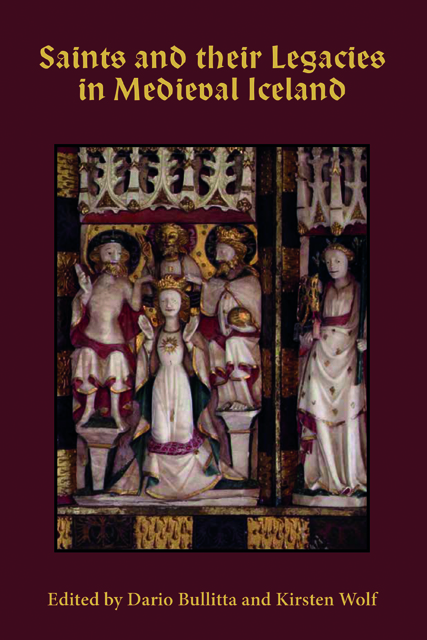Book contents
- Frontmatter
- Contents
- List of Illustrations
- List of Contributors
- Acknowledgments
- List of Abbreviations
- Introduction: The Splendor of the Saints
- Rannsǫkun Heilagra Bóka: The Search for Holy Books
- Heilagir Byskupar: Holy Bishops
- Heilagir Karlar ok Englar: Holy Men and Angels
- Heilagar Meyjar: Holy Maidens
- Bibliography
- Index of Manuscripts
- General Index
- Studies in Old Norse Literature
2 - An Old Norse Adaptation of an All Saints Sermon by Maurice de Sully
Published online by Cambridge University Press: 14 January 2023
- Frontmatter
- Contents
- List of Illustrations
- List of Contributors
- Acknowledgments
- List of Abbreviations
- Introduction: The Splendor of the Saints
- Rannsǫkun Heilagra Bóka: The Search for Holy Books
- Heilagir Byskupar: Holy Bishops
- Heilagir Karlar ok Englar: Holy Men and Angels
- Heilagar Meyjar: Holy Maidens
- Bibliography
- Index of Manuscripts
- General Index
- Studies in Old Norse Literature
Summary
My contribution to this volume may seem out of place, since it deals more with developments in Icelandic preaching than with hagiography in the strict sense. Nevertheless, much of what medieval laypeople knew about the saints must have been learned from the pulpit, and there is ample codicological evidence from the medieval North that saints’ lives and sermons were recognized as cognate genres. The two most important collections of Old West Norse preaching texts, usually called the Icelandic and Norwegian Homily Books, both include material from saints’ lives, and there exist several slightly earlier Old English manuscripts of mixed hagiographic and homiletic content. Furthermore, the sermons for All Saints’ Day that I discuss below are relevant to the volume’s theme in that they reflect – and, in some cases, perhaps helped shape – both traditional classifications of saints and popular ideas about the ranks and relative merits of these different classes.
Old Norse sermons for All Saints’ Day and their European context
Extant manuscripts bear witness to at least four Old West Norse sermons for All Saints’ Day (November 1). The best-attested of these survives in related versions in the Icelandic and Norwegian Homily Books, as well as in a fragment in AM 655 XVIII 4to (c. 1250–1300). Oddmund Hjelde has examined the composition of this sermon in detail and shown that the Old Norse text’s most important source was a (probably) ninth-century Latin All Saints sermon generally known by its incipit Legimus in ecclesiasticis historiis (henceforth Legimus [= BHL 6332d]). The longest and most influential version of this sermon recounts the Christian rededication of the Pantheon by Pope Boniface IV (c. 550–615), explains the reasons for the celebration of All Saints’ Day, and finally lists and describes the various kinds of saints, beginning with the angels and then moving in roughly chronological order through the different classes of human saints: patriarchs, prophets, John the Baptist, apostles, martyrs, confessors, virgins (foremost among whom is the Virgin Mary), and hermits. The sermon is divided into numbered lessons in most surviving manuscript copies. Medieval and earlier modern sources often attributed Legimus to Bede (c. 673–735); more recent scholarship has uncovered evidence pointing to Helisachar of Saint-Riquier (d. c. 833/840) as a possible author, although other candidates, such as Ambrosius Autpertus (d. 784), have also been suggested.
- Type
- Chapter
- Information
- Saints and their Legacies in Medieval Iceland , pp. 29 - 60Publisher: Boydell & BrewerPrint publication year: 2021



